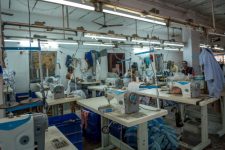New Laws Passed Against ‘Modern Slavery’

New South Wales has become the first Australian jurisdiction to introduce legislation against what has come to be known as ‘modern slavery’.
The new law
The Modern Slavery Bill 2018 (NSW) was introduced into parliament by Paul Green, who was the Chairperson to the Legislative Council Select Committee on Human Trafficking in NSW, which held an Inquiry last year.
The law was passed by both houses of parliament on 21 June 2018.
It will insert a new Division 17 titled ‘Slavery and slavery-like offences’ into Division 10 of the Crimes Act 1900 (NSW) to specifically criminalise conduct such as servitude, forced child labour, forced child marriage and acts that are already offences under sections 270 and 271 of the Criminal Code Act 1995 (Cth), including deceptive recruiting, trafficking in persons and debt bondage.
Defining ‘slavery’
The High Court of Australia handed down its judgment in Australia’s first slavery case in 2008.
The trial of The Queen v Tang involved Melbourne brothel owner Wei Tang and five Thai nationals, who had been working in her establishment.
The decision outlined the indicia of slavery, which are related to imbalance of power, the nature and extent of the exercise of power, and the lack of consent by the exploited party. The determination of whether a person is subjected to slavery considers the whole of the circumstances, which may be many and varied.
There are estimated to be 4,000 people working in slave-like conditions in Australia, primarily in the agricultural, fishing, sex, mining, construction, farming and cleaning industries.
Specific indicators of slavery include pressure to work for low or no wages (often for food and a bed only), having passports confiscated, maltreatment and living in squalid communal accommodation.
The new laws use and provide definitions for the words ‘coercion’, ‘deceive’ and ‘threat’ in an attempt to help guide prosecutors and the courts to decide whether an offence has occurred.
Corporate disclosure
Companies with an annual consolidated revenue of more than $50 million will be required to publish annual statements on the steps taken to address modern slavery in their supply chains and operations.
Under section 24 (5) and (6) of the new laws, such disclosures must be public and include information about:
- the organisation’s structure, its business and its supply chains,
- due diligence processes in relation to modern slavery in its business and supply chains,
- parts of the business and supply chains where there is a risk of modern slavery taking place, and the steps it has taken to assess and manage such risks, and
- training about modern slavery available to employees.
The statements will have to be signed off at board level, and published within six months of the publication of annual reports.
Stated objectives
The objectives of the new laws are:
- to combat modern slavery,
- to provide assistance and support for victims of modern slavery,
- to provide for an Anti-Slavery Commissioner (the Commissioner),
- to provide for detection and exposure of modern slavery that may have occurred or be occurring or that is likely to occur,
- to raise community awareness of, and provide for education and training about, modern slavery,
- to encourage collaborative action to combat modern slavery,
- to provide for the assessment of the effectiveness and appropriateness of laws prohibiting modern slavery and to improve the implementation and enforcement of such laws,
- to provide for mandatory reporting of risks of modern slavery occurring in the supply chains of certain corporate bodies,
- to make forced marriage of a child and certain slavery and slavery-like conduct offences in New South Wales, and
- to further penalise involvement in cybersex trafficking by making it an offence to administer a digital platform for the purpose of child abuse material.
Role of Commissioner
Under section 6 of the new laws, an Anti-Slavery Commissioner will be appointed who is completely independent from the Premier and any other Minister in respect of the exercise of their functions.
Section 9 tasks the Commissioner with combating modern slavery through public advocacy, raising awareness and prosecution while identifying and providing assistance to victims.
The Commissioner must also create a strategic plan on how the objectives of the Act will be met.
He or she is required to prepare an annual report for submission to the relevant Minister, regarding progress of the strategic plan and making recommendations.
Specific offences and penalties
The laws will insert a new Division 17 into Part 10 of the NSW Crimes Act.
The new offences will be embodied in sections 93AB and 93AC, within that division.
Section 93AB(1) will be the offence of ‘Slavery, servitude and child forced labour’, which is where a person:
- holds another person in slavery or servitude and the circumstances are such that the person knows or ought to know that the person is held in slavery or servitude, or
- requires a child to perform forced or compulsory labour and the circumstances are such that the person knows or ought to know that the child is being required to perform forced or compulsory labour.
The maximum penalty for the offence is 25 years’ imprisonment for 25 years.
Subsection (2) will make it clear that forced or compulsory labour does not include:
- work or service normally required of a child who is under detention because of a court order or who, under a court order of this or another jurisdiction, has been conditionally released from detention or ordered to perform work in the community, or
- work or service required because of an emergency threatening the New South Wales community or a part of the New South Wales community, or
- work or service that forms part of normal civil obligations.
Subsection (3) will state that regard may be had to all relevant circumstances when determining guilt or innocence.
Subsection (4) will provide that the following may be relevant in that regard:
- any of the person’s personal circumstances (such as the person being a child, the person’s family relationships, and any mental or physical illness) which may make the person more vulnerable than other persons,
- any work or services provided by the person, including work or services provided in circumstances which constitute exploitation,
- the coercion, threat or deception involved,
- without limiting paragraph (c), whether the person has been coerced, threatened or deceived into doing anything which involves the supply or sale of the person’s tissue (within the meaning of the Human Tissue Act 1983).
Under section (5), the consent of a person (whether an adult or a child) to any of the acts alleged to constitute holding the person in slavery or servitude, or requiring the child to perform forced or compulsory labour, will not preclude a determination that the person is being held in slavery or servitude, or the child is required to perform forced or compulsory labour.
Section 93AC will contain offences relating to ‘Child forced marriage’.
Under subsection (3), it would be an offence punishable by up to 9 years’ imprisonment to:
(a) cause a child to enter into a forced marriage, and
(b) intend to cause, or be reckless as to causing, that forced marriage.
Subsection (4) will prescribe the same maximum penalty for entering into a marriage with a child.
Those who are convicted of these offences will be subjected to prohibitions on engaging in certain types of conduct, any breach of which carries a prison sentence of up to two years and fine of up to $55,000.
The new laws will also prescribe fines of up $1.1 million for companies that:
- fail to prepare a modern slavery statement;
- fail to publish that statement publicly in accordance with the Regulations; and
- knowingly provide false and misleading information in a modern slavery statement.
The laws will also enable courts to make modern slavery risk orders, requiring corporations to take steps towards reducing the risks that such conduct is occurring in its supply chain, and being subjected to checks.
They will also enable victims to access compensation under the Victims’ Rights and Support Act 2013 (NSW).







